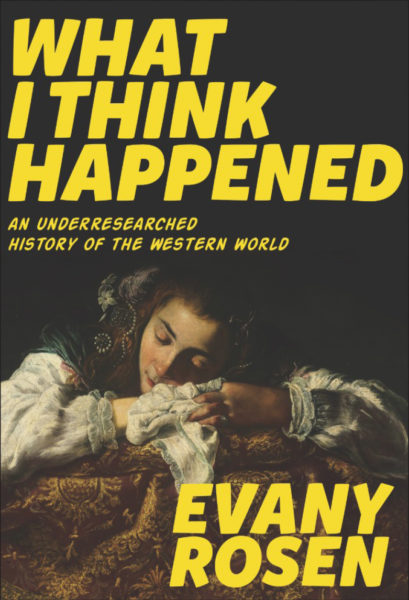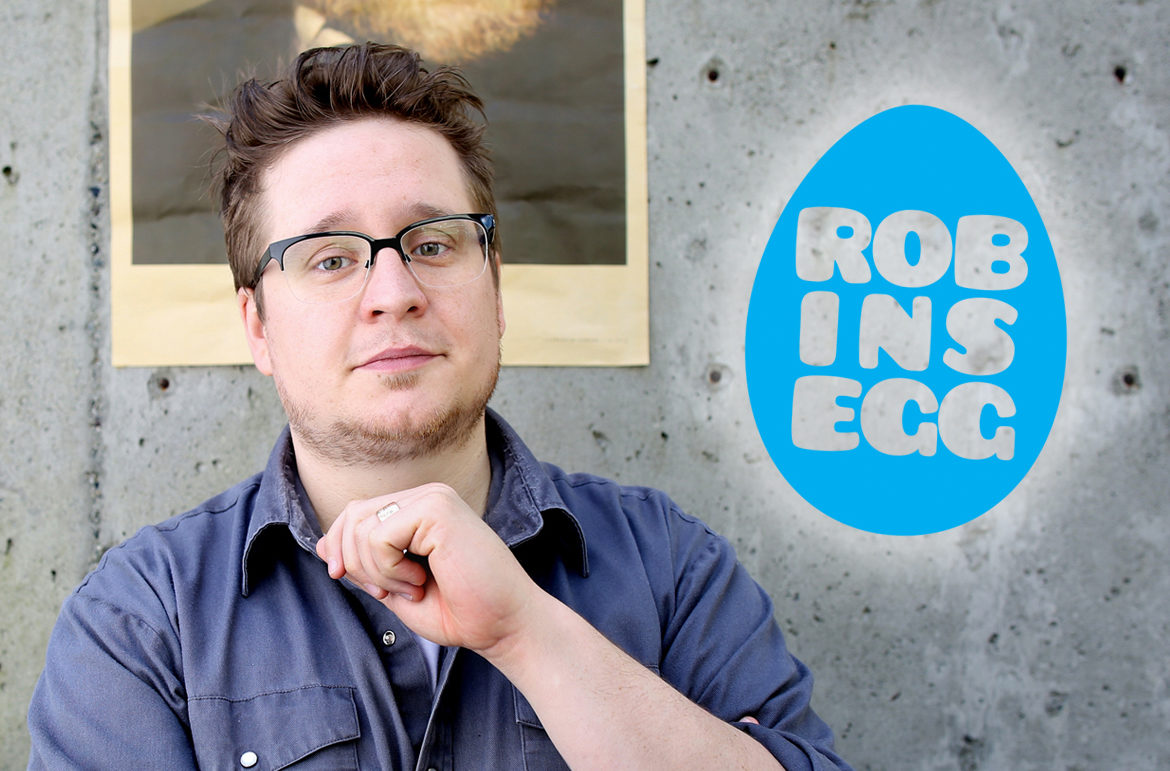In June, Arsenal Pulp Press and author/comedian/playwright Charles Demers announced their “hatched plans” for a new comedy book imprint curated and edited by Charlie. Robin’s Egg Books—named for Demers’s late mother, Robin—intends to publish some of the smartest and funniest comedians on a wide array of cultural topics including history, gender, race, and pop culture.
We caught up with Charlie learn more about his plans for the imprint and the ‘egg’citing books forthcoming.
What inspired the creation of Robin’s Egg imprint—and why now?
I tell this story in my forward to Evany Rosen’s book What I Think Happened, our first in the series, and though it sounds just a little bit too perfect, it’s true: I was watching Evany perform and I thought ‘Jesus, she is such a funny writer. She needs to write a book.’ I wanted her to write a book just so that I could have a chance to read it. Then I started thinking about how many very funny people I know in Canada, who haven’t published yet, or at the moment are exclusively writing movie or television scripts—and who wants to write the kind of stuff you get paid a lot of money for, anyway? I started thinking about the cool, overlapping space I find myself in where I’m in these two worlds, Canadian comedy and Canadian literature, and how little they have to do with each other. So the idea started going from there. I’m so thrilled that Evany agreed to write our inaugural book—and it’s hilarious.
Why is Arsenal Pulp Press the right nest for Robin’s Egg?
I wanted to publish humour books, and I considered the various options on the table, including self-publishing (though I guess it’s not exactly self-publishing when you’re putting out other people’s stuff?). But it seemed to me that the best choice, the one where I’d still have the creative choices I wanted but where the authors would have access to skills that I absolutely don’t have (like design, publicity, et cetera), would be to team up with a cool publisher.
I approached Arsenal Pulp before anyone else, because we’ve had a terrific relationship for a long time, I’ve published two books with them already and have a third coming out next year. I know they make beautiful books, and they have great taste, and they put out consistently terrific, punk rock-type stuff. I didn’t want these books to be corny, as a lot of comic prose tends to be, so I knew that the publisher would have to be hip. To my great excitement, Brian Lam was immediately on board. Literally his only concern was that if they started something like this, they would want it to last; I had made the proposal sound as modest as I could when I came in, but as soon as he said that I confessed that I had the first three years of the imprint already planned out, and that there was no danger of me losing interest.
I could see satire or observational comedy working better than punchlines or more physical-delivery comedic forms. Are you more interested in any particular comedic genres, or do some translate to the page better than others?
I think that different styles of comedy work differently on the page. It think prose comedy is more atmospheric, for instance—you don’t have to hit punchlines with the same frequency you hit them onstage. You don’t have to make a big audience of people whom you’re attempting to keep on your side laugh every ten or fifteen seconds. You’re spinning your comedy directly into somebody’s head, they have all the time in the world with your words, and a smile is as good as a laugh.
Is cultural and social commentary an important aspect of comedy?
Definitely, and it’s certainly a big part of my comedy—and also in the comedy of Evany Rosen, Ryan McMahon, and Alicia Tobin, our first three slated authors. But I’d also be open to publishing something just silly and fun, if it’s good, too.
With most jokes, once you hear the punchline, you can’t re-experience that. What gives comedy (particularly comedic books) staying power—creating something that you want to return to and reread?
I’ll be the first to admit that some comic prose doesn’t age as well as serious stuff — for me, the old writings of somebody like, say, Fran Lebowitz, are funny in a kind of detached and historical way; in the same way that a 25-year-old in 2017 might not think Jackie Gleason is hilarious. Comedy doesn’t always age as well as drama or tragedy because it’s so reliant on rubbing up in a certain way against social mores that are ever-changing. And I think that’s okay—I think that some of the worst writing in the world comes from trying to make something sound or feel immortal. Fresh fruit rots—that doesn’t make it inferior to Twinkies. As Jerry Seinfeld said about Pop Tarts: “they can’t go stale, because they were never fresh.” But a piece of comic prose can have a really good run. I’m interested in facilitating funny, smart, joyful, and incisive stuff. I’m less interested in having it all stand the tests of time, but I won’t be surprised if that also happens, along the way.
How did you get into comedy, and translate that to the page? I understand that not all your works have been comedic and you are a very vocal political activist.
I came to live comedy through my writing. Being funny was always incredibly important to me, and a big part of my identity, and as a political person I started doing more writing that was comic or absurd as well as political. I finally decided to try stand-up for the first time at age 24, which is actually a little late by stand-up standards. Some of my first sets were just me telling absurd stories that I’d written—like one about trying to sneak the then recently-felled statue of Saddam Hussein across the border into the United States. In those days, Zach Galifianakis was regular feature on the Vancouver alternative-comedy scene, and he saw me tell that story, and he approached me after the show and told me how much he liked it. I was sort of stunned and asked him if he was being sarcastic, and he laughed and asked what kind of an asshole he’d have to be to say that.
The press release states that you want to “ give the comedians who kill it on the stage a chance to translate that comedy gold onto the page”. That sounds like these comedians are not writers of the printed form. How much guidance or mentorship will you provide for the comedians, particularly ones who haven’t written comedy in this format before?
I mean, that’s very press release-y language—but it’s not far off. Some people will have done professional prose writing—Ryan McMahon, for instance, is our Fall 2018 author and he’s written extensively for sites like VICE, and CBC, and large newspaper outlets. But at the moment, all the authors we have planned our publishing their first books with Robin’s Egg. So my guidance consists of showing them the ropes in this book-world that I love so much, and which can be very different from live, or broadcast, comedy.
What it is that appeals to you about being the editor of this imprint, and what do you bring to the table?
If there’s nothing new under the sun, and I think that’s usually pretty fair to say, then what’s left are novel and dynamic combinations. I’m not the funniest guy in Canada, or the best writer—but I might be one of a handful of people in the country who has waded as deeply into both worlds simultaneously, so… if you’re the guy with the largest combination of both chocolate and peanut butter, you get to make the cups? Or something like that?
 Robin’s Egg Books’ first title, coming this fall, is Evany Rosen’s What I Think Happened: An Underresearched History of the Western World. In this book of comic essays, Rosen recasts famous historical events from a feminist perspective. How did you come to acquire Evany’s book?
Robin’s Egg Books’ first title, coming this fall, is Evany Rosen’s What I Think Happened: An Underresearched History of the Western World. In this book of comic essays, Rosen recasts famous historical events from a feminist perspective. How did you come to acquire Evany’s book?
I’m a big fan of Evany’s from a while back, and I had her on a stand-up show that I was producing in Toronto as part of my book launch for my essay collection The Horrors. That’s probably why I had books on the brain. I told her that I thought she should write a book. Then, when I was in a position, with Robin’s Egg, to make that happen, I went back again and told her I’d like to publish whatever she wanted to write. She pitched What I Think Happened, and I loved it immediately.
What about the other forthcoming authors? Books by Anishnaabe/Metis comedian Ryan McMahon (of the CBC comedy special UnReserved and podcast Red Man Laughing) and Alicia Tobin (host of Retail Nightmares podcast and the comedy show Come Draw With Me) are forthcoming in 2018 and 2019. How do you know them and get them to write a book?
Ryan McMahon never sleeps, from what I can tell. He is an innovator in Indigenous comedy and digital media who has no predecessors, is absolutely charting his own way and doing it amazingly. We met at the Winnipeg Comedy Festival years ago, and bonded, as fellow anti-capitalist entrepreneurs. That’s a “contradiction” that I really relate to; people who hate the rat race but are also hustlers, and that’s Ryan. He’s been courted by others in the publishing world, a lot of people wanted to be the first people to publish him, so I’m honoured that he’s chosen Robin’s Egg as his launching off point into this world.
Alicia Tobin is a brilliant, sweet, and very sharp comedian, podcaster, and social media presence—it’s hard to describe her perfect combination of gentleness and sardonic darkness… she’s like an Easter Egg with spikes. She’s a brilliant writer and so funny, and I’ve known her for years and so I think it was a pretty easy sell to bring her aboard.
Who is a comedian you would love to publish? Why?
Well, we just lost Dick Gregory, who was a legend, and my Platonic idea of the comedian-activist, and his book From the Back of the Bus was one of the books that made me want to do comedy. If I’m allowed to shoot for the moon, I’d say him.
What are you reading right now?
I’m reading a ton of crime writing these days, because I’m working on a comic crime novel. So I just finished Gene Kerrigan’s The Rage, which was tremendous. I’ve just started reading Cixin Liu’s The Three-Body Problem, and it’s sort of competing for my attention right now with John MacLachlan Gray’s The White Angel, which is simultaneously crime fiction, historical fiction, and set in Vancouver, which makes it a triple threat, for me.
Photo of Charlie Demers by Simon Hayter

